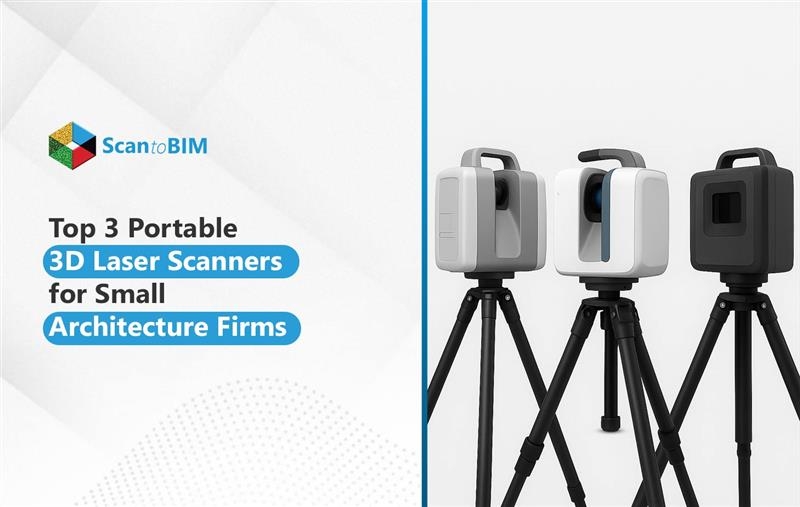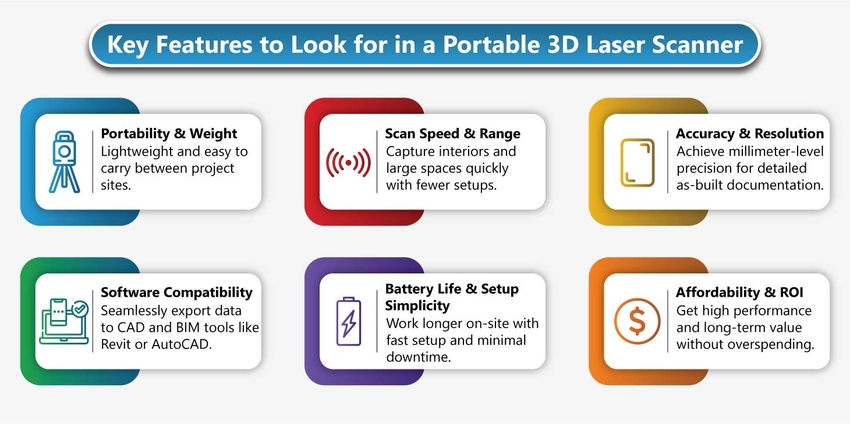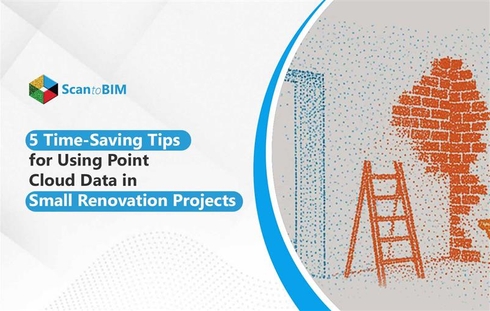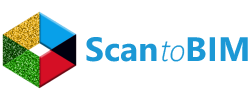
Bringing Precision and Portability to Architectural Workflows
In the current rapidly developing architecture, construction, and engineering (AEC) industry, the backbone of any successful renovation, retrofitting, or documentation project is an accurate as-built data set. Traditional measurement gets the job done, but can include human error and inefficiency, which can be risky, especially for small firms with tight time and budget constraints.
3D laser scanning technology has changed that completely. The cutting-edge technology was once used by large architectural firms, but now it is the new standard for use in small to mid-sized architectural practices. The affordability, capability, and ease of use of 3D laser scanning technology are growing rapidly.
For smaller teams, the best scanner should be:
- Easy to carry between project sites
- Affordable but still accurate
- Easy to use, so it can be set up quickly and requires little training
This article goes over the top three portable 3D laser scanners that maximize performance, portability, and price, along with helping small architecture firms improve accuracy while keeping the firm flexible and productive.
Why Should Small Architecture Firms Invest in Portable 3D Laser Scanners?
For smaller architectural firms, saving an hour or an inch can mean a lot in a project cycle. 3D Laser Scan to BIM Modeling Services allows architects to capture millions of data points in a matter of minutes, allowing them to create highly accurate digital models of existing spaces. This is a huge benefit over the manual way.
Here is how portable scanners provide actionable benefits for small teams:
- Less Time on Manual Measuring: Scanning is fast and will significantly reduce time on the site, giving teams more time to focus on design and documentation.
- More Accurate As-Built Documentation: Scanning removes any measuring deviation and generates point clouds with all surfaces, beams, and columns included.
- Enhanced Collaboration: With accurate data in digital format, architects, engineers, and contractors can use the same model and increase coordination while reducing errors and RFIs.
Today's portable 3D scanners are specifically developed for small firms. They are lightweight, compact, and even costing a measure of even less investment. These tools provide enterprise accuracy without the training or extensive capital costs to set up an industrial 3D scanning system. With the right 3D scanner, a small architecture team can increase accuracy, efficiency, and customer confidence while having a technology stack that is cost-effective.
Important Aspects to Consider When Choosing a Portable 3D Laser Scanner
Choosing the correct 3D laser scanner can greatly affect the accuracy, speed, and efficiency of a small firm's workflow. For a team of architects working with a variety of site conditions, a scanner can provide a balance of accuracy, flexibility, and usability.

The Best 3 Portable 3D Laser Scanners for Small Architecture Firms
Selecting an appropriate 3D laser scanning service can significantly alter how small architectural firms document existing conditions. Here are three reasonably priced scanning devices that can capture a good balance of accuracy, speed, and portability, well-suited for small practices managing multiple projects.
1. Matterport Pro3
Overview: Manufactured by Matterport, the Pro3 uses LiDAR technology to capture precise, quantitative data both indoors and outdoors.
Specifications:
- Weight: 2.2 kg (Approx)
- Accuracy: ±20 mm at 10 m
- Range: Up to 100 m
- Battery Life: Approximately 4 hours (220+ scans per charge)
- Price: Starting at $5,995 (Buy Now)
Strengths for Small Firms:
- Rapid capture time, expansive coverage, and colorful 3D imagery
- An extremely simple cloud-based workflow that shares the files for easy collaboration
- Great ROI for firms that provide virtual tours or deliverables for digital twins
Best Use Cases: Large interiors, building exteriors, and entire buildings where rapid capture is more valuable than precise capture to the sub-millimeter.
Limitations: Software is subscription-based, and the device is a little heavy.
Value Proposition: Best suited for firms that want versatility and rapid project deliverables in varied environments.
2. Shining 3D EinScan Pro HD
Overview: From the company Shining 3D comes this versatile handheld scanner, for more detailed and precise scanning of smaller-scale areas or objects.
Specifications:
- Weight: 1.13 kg
- Accuracy: Up to 0.04 mm (fixed mode)
- Range: 510 mm working distance
- Battery: Tethered via USB (powered by laptop)
- Price: $7,699.00 (Buy Now)
Strengths for Small Firms:
- Extraordinary point clouds with detailed capture and high-resolution
- Modular add-on for color, industrial, or tripod scanning
- Flexible ROI, great for detailed interiors, fixtures, and custom components
Best Use Cases: Renovations, heritage documentation, and precision small area scanning.
Limitations: Doesn't work well in a large space, requires stable lighting, and connection to a computer.
Value Proposition: Provides unbeatable accuracy for small scale architectural and design applications.
3. iMapper Racer 3 Plus
Overview: Brought to you by iMapper, this portable scanner is designed to quickly capture interior data while requiring very little setup time.
Specifications:
- Weight: Lightweight and portable
- Accuracy: ±2 mm
- Range: Room-scale (2–3 minutes per scan)
- Battery Life: 4 hours (Approx)
- Price: $5000 + subscription (Buy Now)
Strengths for Small Firms:
- Fastest workflow for scans of interiors and floor plans
- Cloud-based platform auto-generates usable CAD/BIM outputs
- Low upfront cost with flexible pay-as-you-go pricing
Best Use Cases: Document residential interiors, fit-outs and quickly document existing conditions.
Limitations: Not ideal for large buildings or detailed decorative work.
Value Proposition: A great entry-level scanner offering affordability, accuracy, and simplicity. A good option for firms looking for efficiency without taking on a loan.
Small architecture firms can rely on the Matterport Pro3 for range and speed, the EinScan Pro HD for exceptional detail, or the iMapper Racer 3 for rapid and cost-effective workflows. Each scanner has its own unique balance of performance and value which helps firms improve precision and productivity with little investment.
Comparison Table: Top 3 Portable 3D Laser Scanners in 2025
| Feature | Matterport Pro3 | Shining 3D EinScan Pro HD | iMapper Racer 3 |
|---|---|---|---|
| Type | LiDAR 3D camera | Handheld structured-light | Mobile room scanner |
| Weight | 2.2 kg | 1.13 kg | Lightweight / portable |
| Accuracy | ±20 mm @10 m | 0.04 mm (fixed), 0.045 mm handheld | ±2 mm |
| Scan Range / Speed | Up to 100 m, 360° FOV | Handheld HD 10 fps (~3M pts/s), Rapid 30 fps (~1.5M pts/s) | Room scan ~2 min, multi-axis |
| Battery | ~4 hours / 220+ scans | USB-powered (tethered) | ~4–5 hours |
| Price | $5,995 | $7,699 | $5000 + subscription |
| Strengths | Large spaces, virtual tours, digital twins | High precision, detailed interiors | Fast interior scans, low entry cost |
| Limitations | Moderate detail, subscription cost | Limited large-space scanning, lighting dependent | Not for large structures, lower fine-detail capture |
| Best Use | Whole buildings, exteriors, walkthroughs | Detailed interiors, fixtures, heritage elements | Interiors, floor plans, quick as-built |
Guidelines for Small Firms to Consider When Choosing a Portable 3D Laser Scanner
For small architecture firms, the right choice of 3D scanner can have a significant impact on improving workflows and accuracy on projects.
When choosing a scanner, there are a few points to take into consideration:
- Project Size & Existing Site Conditions: Think about whether your projects tend to be primarily interiors, exteriors, small renovations, or larger buildings. Select the scanner that meets the parameters of common site conditions and lighting conditions that you work in.
- Software Compatibility: It’s advantageous to make sure the export formats of the scanner, i.e., point clouds, meshes, are compatible with your existing CAD or BIM Software, which is crucial for a seamless workflow.
- Ease of Use & User Training: Choose systems that can be adopted easily and trained in quickly so your team experiences less downtime and can use the device sooner rather than later.
- Support and Warranty: Always check how the manufacturer will support you, if there are service options, and warranty coverage to ensure your investment.
- Try Before You Buy: Whenever possible, test the device on demo or rent methods to understand usability, time, and output before investing in your own scanner.
If you follow these points, you can be assured that your firm will have a scanner that will improve efficiency while maintaining accuracy and return on investment.
Final Thoughts & Next Steps
A portable 3D laser scanning services allows small architecture firms to gain accuracy, efficiency, and a better competitive position on project deliverables. The Matterport Pro3, the Shining3D EinScan Pro HD, and the iMapper Racer 3 all offer different benefits for different project types, ranging from a large complex interior to detailed, smaller components. Small firms should carefully consider the compatibility with their workflow, software compatibility, and budget before deciding on a scanner. There is often great value in testing out demos or speaking to a supplier to ensure the best fit.
Are you looking for expert solutions to streamline documentation and accelerate project timelines?








